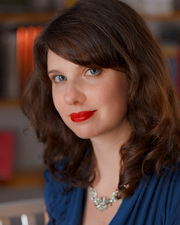"If a book has 250 reviews with 4 and 5 stars, and 70,000 in sales,
this author has a lot of promise."
-- Michelle Brower
If you're an Indie author looking for an agent, take note! In this Part II of my interview with literary agents Jeff Kleinman and Michelle Brower of Folio Literary Management, they open up about industry numbers that tend to grab their attention by sharing the importance of Amazon rankings, reviews, price points, and book sales.

Michelle Brower: Photo Courtesy of Folio Literary Management
Michelle: It definitely depends on genre because an author would need more romance sales to actually impress an editor in that market; whereas in women's fiction, historical fiction, or literary fiction, an author doesn't need quite as many sales. What I'm ultimately looking for is sales north of 60,000. But, a book's price point is also important. I cross-reference those two numbers to calculate about how many sales a publisher would be able to reasonably expect.
Price point matters because 50,000 sales is not just 50,000 sales. 50,000 sales at $.99 is one thing. 50,000 sales at $3.99 is another. 50,000 sales at $6.99 is entirely another. We can't sell books at $.99 and make money. Because of these factors, we find the e-book market to be very price sensitive.
As for free, if an author had 30,000 free downloads, we can't really use that as a number to determine whether or not it would translate well into the traditional market.
Q: How important are Amazon rankings?
Michelle: Amazon rankings are important for different reasons. I actually think they are really important if you want to grab the attention of an agent because that's mostly how someone would see a book... when it pops up higher in rankings. Those could have halo effects. For self-published authors, I would generally recommend starting with a little bit higher price point, but getting sales so that the rankings improve. The more readers hear about and buy a book, the more the book gets reviews, and it sort of all snowballs.
Ultimately, the ranking for us is really not what we are looking at though. Why? Because it doesn't matter at the end of the day if a book ranks #2 on Amazon because it sold 1,000 copies in one day but it never sold anymore or very few.
Q: How important is it for an author to have more than one book?
Michelle: It's critical for an author to create a relationship with their readers by having more than one piece of material. I always look at the relationship between the author and their readers. Most of the successful self-published authors will get a new reader on their second book who will go back and read the first one.
If an author has a series, that can definitely help, but I also think it's just the book. If a reader likes an author, they are more likely to go back and purchase something else or wait for the next release. I think that that's something in publishing that's not really considered the brand. It's actually the author who is the brand. If an author is doing well, readers will come back whether they are sci-fi, fantasy, or romance.

Jeff Kleinman: Photo Courtesy of Folio Literary Management
Keep in mind that readers buy the successor books for one of two reasons. One is an author whose name they start to trust and the other is because of a character they start to trust. For example, a lot of times they won't know the author, and they just want to read more because of the character. Jack Reacher is a great example. A reader can know Jack Reacher, but they might not know Lee Child is the author.
Q: How influential are reviews?
Michelle: We tend to put reviews into two sections: customer reviews from Amazon or GoodReads only and "other reviews," because we know there are a lot of services out there providing reviews. Some of those "other reviews" have made a big difference for authors. For example, Darcie Chan had a Kirkus Review that ended up really launching her.
Reviews are intensely important for visibility. I'm generally looking for a book with upwards of 100 reviews, and that they're good reviews because certainly if a book has 200 reviews with several 2 star reviews, that won't interest me. So even though I'm looking at upwards of 100, I'm more comfortable somewhere in the 300 range. I think that at 100 reviews, a book doesn't have the sales yet to necessarily translate into traditional publishing.
Reviews are important because they affect visibility in the Amazon system. Amazon has algorithms I don't pretend to begin to understand, but one of the pieces is the number of reviews and at what level. It's important for self-publishers to work at increasing reviews and hopefully having them snowball into more reviews and sales.
Ultimately, when presenting to a publisher, I provide a cross-section. If a book has 250 reviews with 4 and 5 stars, and 70,000 in sales, this author has a lot of promise. Alternatively, if a book has 200 reviews and only 10,000 sales, it's going to be so much more challenging to present them and say, "You should invest money in this author."
***
Did you miss Part I? Click here.
Follow Heather Hummel on Twitter: www.twitter.com/HeatherHummel
This post originally appeared on the Huffington Post.

No comments:
Post a Comment